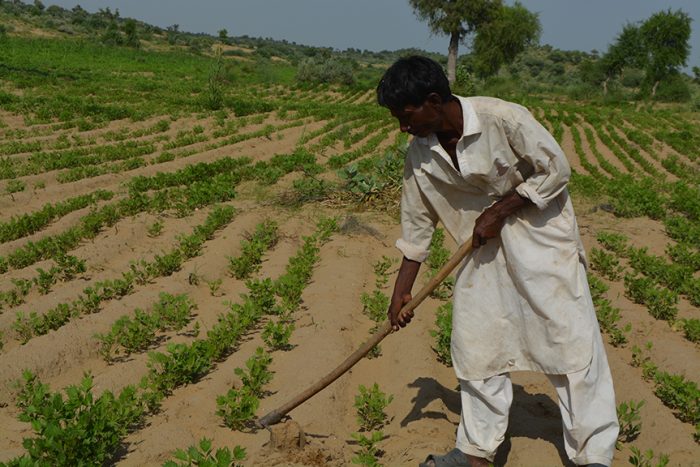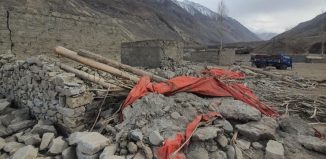Supporting local farmers fight off catastrophic locust swarms in Pakistan
“I earn PKR 300 everyday (Approx. USD 3) working at a brick kiln. I also own ten acres of farmland; however, the cultivation is far less due to lack of rainfall and proper irrigation in the area. This year I was only able to grow Guar[1] on the field as the cash assistance provided by Community World Service Asia was consumed for tillage on the land. I purchased Guar seeds from a loan I took from a local seller. I am confident that I will be able to pay off the loan after the harvest season,” shares Mangal, a resident of Vickloker village, located in Umerkot. He lives with five other members of his family. Before the locust attacks they all lived a comfortable and content life together.
In 2019, Mangal cultivated Guar on his land, but the locust invasions completely destroyed the crops. The attacks proved to be catastrophic for the local crops in most parts of Southern Pakistan. Lack of harvest in the area affected the livelihoods of many farmers.
“The earnings we received after selling the crops helped us fulfil our family needs and household expenses. Sadly, this year we had nothing to sell or earn. The local farmers have followed conventional approaches to combat the attack of the locusts. These techniques included making noise and the use of fire smoke. Unfortunately, these attempts did not help much and most of the fields were left bare and eaten. As a result there was no harvest season.”
As part of an Emergency Response project, Community World Service Asia (CWSA), supported by Japan Platform, provided cash assistance to 1600 agrarian families this August. Rural families whose livelihoods were most affected by locust attacks and COVID-19 received conditional cash grants that helped farmers to plough lands to eradicate locust eggs before hatching.
“If effective steps to stop the hatching of new eggs are not taken, existing crops will be destroyed and this will eventually have a significant impact on farmers’ food security and welfare. However, the support we got this year saved us.”
Mangal’s family was among families that received a cash grant of PKR 13500/- (Approx. USD 86) under the emergency response project in Umerkot.
Mangal plans to save some of the harvested crops for household use and sell the rest in the local market as a means of livelihood.
“The money is going to help me repay the loan I took earlier to manage household expenses and to help me buy food for my family.”
[1] Guar is an important legume crop. It is cultivated for fodder as well as for grain purpose.







